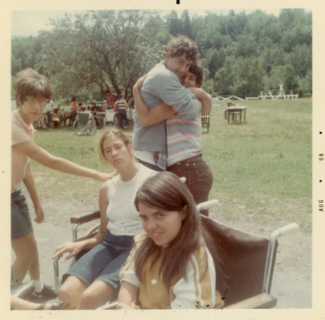Crip Camp (Nicole Newnham, Jim Lebrecht): USA
Reviewed by Larry Gleeson.
 Viewed at the 2020 Sundance Film Festival. Crip Camp, executively produced by Barack and Michelle Obama, tells the story of Camp Jened, a summer camp for disabled teens in upstate New York, close to Woodstock. What started out as a rather traditional camp in 1951, morphed into a social experiment as the times were a-changing. In 1967, a new methodology, inspired by the Civil Rights Movement and engineered by hippies, was implemented. Allowing camp attendees full expression to share intimate thoughts and feelings, a shift in consciousness was implanted. Social interactions were encouraged and became normalized.
Viewed at the 2020 Sundance Film Festival. Crip Camp, executively produced by Barack and Michelle Obama, tells the story of Camp Jened, a summer camp for disabled teens in upstate New York, close to Woodstock. What started out as a rather traditional camp in 1951, morphed into a social experiment as the times were a-changing. In 1967, a new methodology, inspired by the Civil Rights Movement and engineered by hippies, was implemented. Allowing camp attendees full expression to share intimate thoughts and feelings, a shift in consciousness was implanted. Social interactions were encouraged and became normalized.
Filmmaker/Directors Nicole Newnham and Jim LeBrecht (Camp Jened attendee) utilized archival footage captured by The People’s Video Theatre company from 1970-72 at Camp Jened as well as personal video footage from camp members provided an introduction to the future leaders and prime movers of the American Disabilities Act. Present-day interviews and voice-over narrations provided valuable context to these pivotal moments for the disabled community in the United States.
No longer allowing themselves to be institutionalized in horrific environments like the one portrayed in the film, Willowbrook State School, where one voice-over narrator commented she had never heard such an unnerving sound as the wailing howl emanating from the institutionalized at Willowbrook. Statistics revealed 50 Willowbrook disabled residents were cared for by one attendant. Malnutrition was rampant and the individuals residing within its dark walls only hope was death.
In juxtaposition, the members at Camp Jened held meetings to discuss what dinners, entertainment, exercise, and social events would be like. They co-created their environment. Those that needed attendants had them – often times their attendants were camp veterans.
The disabled were emerging from Camp Jened stays hungry to experience a full life and make valuable contributions to society. Unfortunately, the disabled were not allowed access to a normal life. Thus began, the movement. Headed by Camp Jened committee leader, Judy Heuman, the disabled organized themselves, to gain access to schools, universities, hospitals and federal buildings. Many would go on to achieve college educations, Master’s Degrees and make valuable contributions to society in the arts and sciences as well as in business.
Unbeknownst to many today, this small group also caused a major uproar. And Crip Camp lays it all out in the open with archival footage and voice-over narration. In 1973, the passage of Section 504 of the Rehabilitation Act gave the disabled minority status. Demanding access to schools, hospitals, and federally funded buildings, the disabled were told no by President Richard “Dick” Nixon. An archival recording of Nixon’s voice saying “it would cost too much money to provide the (disabled) access.” An ensuing lawsuit citing Brown v Board of Education and the shooting down of “separate but equal” beamed light into the lives of the disabled.
Yet, the provision included in Section Clause 504, stating any new federally funded buildings had to ensure disability access was not being enforced and plans to forgo any re-authorization were undertaken by the Reagan Administration. Yet, the disabled would not be denied and began a protest in San Francisco. Footage and archival photos were captured and voice-over narration explained the feelings and angst. Aided by various groups and business owners including Vietnam veterans, the Black Panthers and a lesbian bar owner the group found support and hope. Yet, nothing was coming out of Washington, D.C. and Secretary of Health, Education and Welfare Joseph Califano would not recognize the group publicly or privately, the group had to go to war with the nation’s capital to win.
With a stroke of luck, the networks were having technical issue and the American Broadcasting Company ran work gathered by an embedded reporter that reached a national audience. Finally, Secretary Califano provided the group with an audience. The archival news reports, Presidential tape recordings and footage captured by an embedded reporter verifies the struggle.
Massachusetts Senator Ted Kennedy got behind the movement and the American Disabilities Act was finally introduced into the 101st Congress (1991). It passed and made discrimination against the disabled a civil rights violation. ADA and the disabled were given a long-awaited and much-needed access. They were finally given a voice and were allowed to be heard.
The fight continues today, as numerous statistical data finds disabled storytelling has a financially lucrative viewing audience. Several of the Camp Jenet attendees were in Sundance including the unofficial leader, Judy Heuman. The dream to be part of the American way of life burns brightly. And, ever so brightly in Crip Camp.
Crip Camp is a must-see film!
About this entry
You’re currently reading “Crip Camp (Nicole Newnham, Jim Lebrecht): USA,” an entry on Student Film Reviews
- Published:
- 01.27.20 / 7am
- Category:
- Documentary, Sundance 2020
1 Comment
Jump to comment form | comments rss [?]